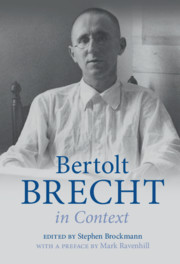Book contents
- Bertolt Brecht in Context
- Bertolt Brecht in Context
- Copyright page
- Contents
- Figure
- Notes on Contributors
- Chronology
- Abbreviations
- Preface
- A Note on Brecht in English
- Introduction
- Part I Brecht’s World
- Chapter 1 Brecht’s Augsburg Years
- Chapter 2 Models for Epic Theater from the Munich Years:
- Chapter 3 Brecht in the Weimar Republic
- Chapter 4 Brecht’s Emergence as a Young Poet
- Chapter 5 Brecht and Music: The Fly in the Amber
- Chapter 6 Brecht and Political Theater
- Chapter 7 Brecht and Germany
- Chapter 8 “[She] made suggestions. We took them”: Bertolt Brecht’s Women Collaborators
- Chapter 9 Brecht’s Interviews
- Chapter 10 Brecht and Exile
- Chapter 11 Brecht and the German Democratic Republic
- Chapter 12 The Berliner Ensemble
- Part II Brecht’s Work
- Part III The World’s Brecht
- Concise Bibliography
- Index
Chapter 5 - Brecht and Music: The Fly in the Amber
from Part I - Brecht’s World
Published online by Cambridge University Press: 28 May 2021
- Bertolt Brecht in Context
- Bertolt Brecht in Context
- Copyright page
- Contents
- Figure
- Notes on Contributors
- Chronology
- Abbreviations
- Preface
- A Note on Brecht in English
- Introduction
- Part I Brecht’s World
- Chapter 1 Brecht’s Augsburg Years
- Chapter 2 Models for Epic Theater from the Munich Years:
- Chapter 3 Brecht in the Weimar Republic
- Chapter 4 Brecht’s Emergence as a Young Poet
- Chapter 5 Brecht and Music: The Fly in the Amber
- Chapter 6 Brecht and Political Theater
- Chapter 7 Brecht and Germany
- Chapter 8 “[She] made suggestions. We took them”: Bertolt Brecht’s Women Collaborators
- Chapter 9 Brecht’s Interviews
- Chapter 10 Brecht and Exile
- Chapter 11 Brecht and the German Democratic Republic
- Chapter 12 The Berliner Ensemble
- Part II Brecht’s Work
- Part III The World’s Brecht
- Concise Bibliography
- Index
Summary
Bertolt Brecht, the most influential playwright of the twentieth century, is unthinkable without music.Many of his poems, as well as his forty-eight completed dramas and roughly fifty dramatic fragments, are connected to music.There is hardly another writer or dramatist of the twentieth century who based his work as clearly and decisively on the complex relationship between music, text, and drama.Brecht worked with some of the most important composers of the twentieth century, in particular Kurt Weill, Hanns Eisler, and Paul Dessau.Although Brecht rejected some of the aesthetic ideas and ideology of Richard Wagner, in his ambition to combine the arts together and to leave a major legacy, he nevertheless in some respects ultimately came to resemble Wagner.The music connected to Brecht‘s texts is performed and passed on in the media throughout the world, from the early recordings made by the young Brecht himself all the way to innumerable versions of his “Ballad of Mack the Knife” created and spread by the globalized music market.
Keywords
- Type
- Chapter
- Information
- Bertolt Brecht in Context , pp. 49 - 56Publisher: Cambridge University PressPrint publication year: 2021

